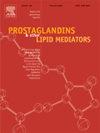补充蜂胶对炎症生物标志物的影响:随机对照临床试验的荟萃分析和系统回顾
IF 2.5
3区 生物学
Q3 BIOCHEMISTRY & MOLECULAR BIOLOGY
Prostaglandins & other lipid mediators
Pub Date : 2024-10-28
DOI:10.1016/j.prostaglandins.2024.106915
引用次数: 0
摘要
最近的干预性研究表明,补充蜂胶对炎症生物标志物有有益影响;然而,这些结果尚未在一项全面的荟萃分析中得到总结。我们进行了这项荟萃分析,以总结所有可用数据,为蜂胶补充剂是否影响炎症生物标志物提供明确证据。本系统综述和荟萃分析是通过检索数据库(PubMed/Medline、Web of Science、Scopus 和 Embase)进行的,检索期截至 2024 年 2 月。研究纳入了评估蜂胶补充剂对成人炎症生物标志物影响的随机临床试验(RCT)。该综述包括20项随机临床试验,共有1139人参与。与对照组相比,补充蜂胶可明显降低IL-6(WMD = -2.48;95 % CI:-4.62,-0.34;P = 0.023)和TNF-α(WMD = -0.86;95 % CI:-1.45,-0.26;P = 0.005)。虽然 CRP 浓度没有降低(WMD = 0.01;95 % CI:-0.03,0.05;P = 0.646),但补充时间≥ 10 周的 CRP 水平显著降低。这些结果表明,蜂胶对TNF-α和IL-6水平具有有益的影响,可作为一种有效的辅助疗法,用于治疗炎症是病因中关键因素的疾病。由于研究数量有限、临床多样性和其他局限性,有必要开展更多高质量的研究,以提供更准确、更全面的建议。本文章由计算机程序翻译,如有差异,请以英文原文为准。
The impact of propolis supplementation on inflammatory biomarkers: A meta-analysis and systematic review of randomized controlled clinical trials
Recent interventional investigations suggest the beneficial impact of propolis supplementation on inflammatory biomarkers; however, the results have not been summarized in a comprehensive meta-analysis. We conducted this meta-analysis to summarize all available data and provide clear evidence for whether propolis supplementation affects inflammatory biomarkers. This systematic review with meta-analysis was performed by searching databases (PubMed/Medline, Web of Science, Scopus, and Embase) until February 2024. It included randomized clinical trials (RCTs) assessing the effects of propolis supplementation on inflammatory biomarkers in adults. This review included 20 RCTs with a total of 1139 participants. The propolis supplementation significantly reduced IL-6 (WMD = −2.48; 95 % CI: −4.62, −0.34; P = 0.023) and TNF-α (WMD = −0.86; 95 % CI: −1.45, −0.26; P = 0.005) compared with control groups. Although the CRP concentration was not reduced (WMD = 0.01; 95 % CI: −0.03, 0.05, P = 0.646), a significant reduction in CRP levels was revealed in supplementation durations ≥ 10 weeks. These results suggest that propolis has a beneficial effect on TNF-α and IL-6 levels and may be an effective adjunctive therapy for diseases where inflammation is a key factor in the etiology. Due to the limited number of studies, clinical diversity, and other limitations, it is necessary to conduct more high-quality studies to provide more precise and comprehensive recommendations.
求助全文
通过发布文献求助,成功后即可免费获取论文全文。
去求助
来源期刊

Prostaglandins & other lipid mediators
生物-生化与分子生物学
CiteScore
5.80
自引率
3.40%
发文量
49
审稿时长
2 months
期刊介绍:
Prostaglandins & Other Lipid Mediators is the original and foremost journal dealing with prostaglandins and related lipid mediator substances. It includes basic and clinical studies related to the pharmacology, physiology, pathology and biochemistry of lipid mediators.
Prostaglandins & Other Lipid Mediators invites reports of original research, mini-reviews, reviews, and methods articles in the basic and clinical aspects of all areas of lipid mediator research: cell biology, developmental biology, genetics, molecular biology, chemistry, biochemistry, physiology, pharmacology, endocrinology, biology, the medical sciences, and epidemiology.
Prostaglandins & Other Lipid Mediators also accepts proposals for special issue topics. The Editors will make every effort to advise authors of the decision on the submitted manuscript within 3-4 weeks of receipt.
 求助内容:
求助内容: 应助结果提醒方式:
应助结果提醒方式:


